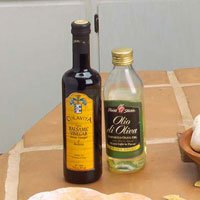In my previous article I promised you that I would talk about the other macronutrients, which are of course, protein and fat. I also promised to give you a brief update on my preparation status and tactics in concerns of my first contest of the 2002 competitive season. (That information is in my next article.)
Proudly, this is my first year as a Bodybuilding.com bodybuilder, and let me tell you after seeing myself go through my "mini-peak" this morning; the crowd is in for a surprise. They will be flooding the Bodybuilding.com website after they see me represent the company in such a professional and polished way.
To say the least my physique is going to be really polished this year. My physique has matured significantly over the past two years. Well, "let's get it on" and begin with covering the other two macronutrients, so we can get into the "meat & potatoes" of what you guys really want, contest information in the next article.
Because I have been receiving a flood of emails, which I love by the way, I decided to speak about fat & protein in a unique way. I am going to post a question and answer session done in an e-consult that I had with a client of mine. Since I did not consult with her on publishing this case I will use the confidentiality method and we will call her L.S.
Cardio and Plateau Questions
[ Q ] Hi Dino, This is L.S. I don't know when would be a good time to get together, but let me just tell you what my goals are, and if it's too much to do by e-mail, then I'll set something up with you at the gym, o.k.? Most important to me right now is getting my body fat down. I am 5' 9 1/2" and weigh 160 at 25% body fat. I would like to get it down to around 15%. I know I will have to add more cardio to my workouts, running, etc., which I've begun, but the diet part of it I think is my problem.
L.S., first and foremost please do not try to kill yourself over a fat reading machine or device.
If anything only use one, the same one, as a source of reference. In other words if you were 25% one week and two weeks later you are 23% (on the same reading device) you know that you are making progress.
I have been on stage in competition condition and the calipers had me at 9-10%, but I looked closer to 6-7%. Get the point here? These things are not extremely accurate and the mirror is a much better way of assessing yourself anyways.
[ Q ] I've changed my lifestyle a few years back and lost 50 lbs. to get where I am now, but feel I've reached a plateau that I can't get through. Actually, I feel like I'm not eating enough (although I eat a high protein, fairly clean diet) or maybe eating the wrong things at the wrong times, etc?
- Congratulations on your accomplishments! Obviously you are or at least have been doing something right, right? I mean you have lost 50lbs! Now you have reached the stage that all of the top athletes face, that last bit of hard to get to "stubborn" body fat. This is usually the part that people have trouble understanding. This calls for and explanation of the theories behind timing of carbohydrates, fat, and protein. The following should help you tremendously!
Protein
It is important to understand that protein and carbohydrates compete for absorption. This is the main reason for trying to consume a sole carb or protein meal and to avoid food mixing. Fat has little to do with competing for absorption because it is (for the most part) used in the form of energy, stored as adipose tissue (fat), clogs arteries, or used in hormone production.
Protein is muscle; think about it what is a chicken breast? It is a huge muscle. Muscle is protein. Inside of our skeletal muscle cells there are many nutrients found, but the main structural item is protein. Therefore the old bodybuilding saying protein is muscle-muscle is protein stands to be true. The body can only assimilate X amount of food in the form of protein into useable free-form amino acids at one time.
If you are ever hungry while dieting, consume some sort of protein, try to choose a source that is low fat and zero to low carbs. This extra meal of protein will not make you "fat" and can only benefit the dieter. The old way of dieting made people go hungry for hours, limiting them to 3-4 meals a day, this is not good and is a form of voluntary starvation. This resulted in hunger pains, and a loss of muscle along with fat.
The new way brought about better-conditioned athletes that were able to hold on to much more muscle mass. We only want to lose fat, (not muscle) so "eat up" on protein. I have never heard of a bodybuilder getting fat on protein, or having a protein-eating binge. And if they did go on one (protein binge) I would not frown on them. We enjoy the stuff but do not crave it, as we tend to do with carbs.
Fats
Basically I never provoke the addition of fat to a diet. There is usually enough in the food that you eat, but there are times when we can use fat to our advantage. Let us say that I want to go to the gym and I know that I have to eat for great performance, but I hate training on a full stomach. Furthermore, I hate nothing more than the feeling of being hungry.
What should I do? I traditionally consume my pre-training workout meal 1.5 hours before I train and purposely add some fat to it. I know what you are thinking here. Why in the world would I do that, why would he add fat to his diet? Well the right type of fat is and can be beneficial.
I blame the health community mainly for these bizarre assumptions. For example, dietitians have scared the population into believing that fat, and high protein diets are evil. These ignoramuses are also the people who associate our sport with drug abuse and kidney failure. Neither is true! Fact!
"Most of these people do not exercise and are fat bodies preaching from an outdated textbook."
Okay-okay, I am off the soapbox, sorry, man I had to vent that out!
Fats will slow down the digestion of protein, now we do not want to hold the protein in the stomach forever because the acidic environment will denature and damage the precious protein. What we want is to slightly slow emptying into the small intestine with useable fats (i.e. Smuckers Natural Peanut Butter 1-2 Tbsp) and assimilateable proteins (protein that can be used in a proper fashion).
So we are fueling our bodies during training with fat and sending in some amino acids at the same time, which is what we need to be doing at that time. We accomplish all this and avoid hunger pain and the awful "full-bloated feeling" in the stomach. Wow, we have just used food science to create a perfect environment! Science is pretty cool after all.
Another way to use fat is for energy. When we embark on a low carbohydrate eating regimen there will be times when we have low blood sugar levels and we will feel sluggish, pulled on, sucked back, or drawn as bodybuilders would commonly say. We can avoid this feeling by putting a little fat into the body. This fat will be used as energy.
If the body is producing ketones the fat will be broken down into a ketone body to be used as fuel. Now, what if we do not use this little fractured fat AKA ketone body as energy? It will be passed through the body's byproduct of metabolism elimination processes (sweat, urination). By taking in only a few fats I promise you will feel an instant energy boost.
 |
What Are Ketones? Ketone bodies are water-soluble compounds that are produced as by-products when fatty acids are broken down for energy in the liver and kidney. They are also used as a source of energy in the heart and brain. |
 |
 |
||
This is very cool; you see fat digestion begins in the stomach not the small intestine so as soon as it hits the stomach we can start to feel its effects within minutes (Really!). Generally a minimum of 30-50 grams should be consumed daily to assure healthy production of hormones, especially females.
I have worked with women that have experienced hair loss primarily due diets that contain little to no fats. Others experience menstrual cycle problems, which can lead to required hormone therapy or a change in diet. I would rather have my body produce the normal ranges of hormones on its own, at least for as long as it can, than to get on hormone therapy. The info above should help you, I have added some food sources for you to consider below.
| Protein & Fats | ||||
|
Sodium Intake Question
[ Q ] Sorry this is so long, I'll send other questions (about sodium intake etc.) after I hear your critique. Thanks for the help, Dino, and don't be afraid to send constructive criticism also, I can take it!
- This should help you understand a little more of the how and why we eat what we eat. As far as Sodium, you can send in the ?'s I would love to answer them, but we won't even mess with it unless you are trying to peak out for a photo shoot or contest.
The fact that you drink lots of H2O is good because you need it to process the protein, filter the kidneys, and remain hydrated. (The creatine will help keep your muscles hydrated as well.)
- Lastly L.S., if you want to ask if you can or can't have a certain food please do so. These are the foods that I like to diet on, but there are an endless amount of great dieting foods. Try to spread your meals over 6-13 feedings each day. Do not limit yourself to a certain number of meals.
If you are hungry consume some protein, heck call it a snack if you have to, just eat! Eating smaller more frequent meals allows the body to properly digest the food and increases your metabolism.
Conclusion
That is a typical consult response that I give to my clients. I think that it will help you out in general as well, but remember each and everyone of us are so unique and different. Your goals may not be similar to hers. But in any case nutrition can get you on the right track no matter what your goal consist of. It really is 70-75% of the results you desire no matter what they are.

